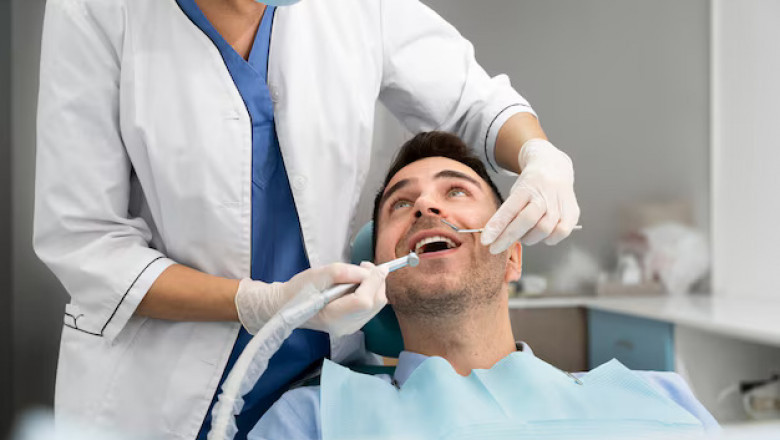views
A good night’s sleep is essential for overall health, but did you know that your oral health could be impacting your sleep quality? Poor oral hygiene and dental issues can lead to problems such as sleep apnea, teeth grinding, and discomfort that disrupts restful sleep. In this article, we’ll explore the connection between oral health and sleep, identify key symptoms to watch for, and provide actionable tips to improve both.
How Oral Health Affects Sleep
Oral health and sleep are closely linked in several ways. Certain dental conditions can cause discomfort, breathing problems, and other disturbances that prevent you from getting deep, restorative sleep. Here are some of the key ways poor oral health can impact your sleep:
1. Sleep Apnea and Breathing Issues
Obstructive Sleep Apnea (OSA) is a serious sleep disorder where breathing repeatedly stops and starts. This condition is often linked to oral health, as factors like misaligned teeth, a small jaw, or swollen oral tissues can contribute to airway obstruction. People with untreated sleep apnea may experience snoring, daytime fatigue, and an increased risk of heart disease and stroke.
2. Teeth Grinding (Bruxism)
Bruxism, or teeth grinding, is another common issue that affects sleep quality. Many people grind their teeth unconsciously at night, which can lead to jaw pain, headaches, and worn-down enamel. This habit is often linked to stress but can also be triggered by misaligned teeth or other dental problems.
3. Gum Disease and Tooth Pain
Inflammation caused by gum disease (gingivitis or periodontitis) can lead to discomfort and pain that makes it difficult to fall and stay asleep. Infections, cavities, and untreated dental issues can cause persistent throbbing, making it nearly impossible to rest peacefully.
4. Dry Mouth and Snoring
A lack of saliva production (dry mouth) can lead to discomfort, increased bacteria growth, and even snoring. Since saliva plays a vital role in keeping your mouth healthy by neutralizing acids and washing away bacteria, reduced saliva levels can contribute to oral health problems that, in turn, affect sleep.
Signs Your Oral Health May Be Affecting Your Sleep
If you experience any of the following symptoms, your oral health could be interfering with your sleep:
-
Chronic snoring or gasping for air during sleep
-
Frequent headaches or jaw pain in the morning
-
Sensitivity in your teeth or gums
-
A dry mouth that disrupts sleep
-
Teeth grinding noises noticed by a partner
-
Waking up with a sore jaw or facial tension
How to Improve Oral Health for Better Sleep
Fortunately, improving your oral health can lead to better sleep quality. Here are some steps to help:
1. Maintain a Strong Oral Hygiene Routine
Brushing twice a day, flossing daily, and using mouthwash can prevent cavities, gum disease, and bad breath, all of which can contribute to sleep disturbances.
2. Visit Your Dentist Regularly
Routine dental checkups can help identify and treat issues like gum disease, cavities, and misaligned teeth before they start affecting your sleep. If you’re preparing for a major procedure, remember the things to do before a dental restoration to ensure a smooth and pain-free recovery.
3. Consider a Night Guard
If you suffer from bruxism, a custom-fitted night guard can protect your teeth and alleviate jaw pain, leading to better sleep.
4. Address Sleep Apnea with a Dental Professional
Dentists can recommend oral appliances that help keep airways open, reducing sleep apnea symptoms and improving breathing at night.
5. Stay Hydrated and Avoid Alcohol Before Bed
Drinking water helps maintain saliva production, while alcohol can dry out your mouth and worsen snoring. Staying hydrated can significantly improve both oral health and sleep quality.
6. Reduce Stress and Practice Relaxation Techniques
Stress is a major contributor to teeth grinding and jaw tension. Try meditation, deep breathing, or gentle stretching before bed to relax your muscles and prevent nighttime grinding.
Conclusion
Oral health plays a crucial role in the quality of your sleep. Issues like sleep apnea, teeth grinding, gum disease, and dry mouth can all contribute to restless nights and overall fatigue. By maintaining good oral hygiene, visiting your dentist regularly, and following things to do before a dental restoration, you can improve both your oral health and sleep quality. Prioritizing these habits will help you wake up feeling refreshed and energized every morning!






















Comments
0 comment